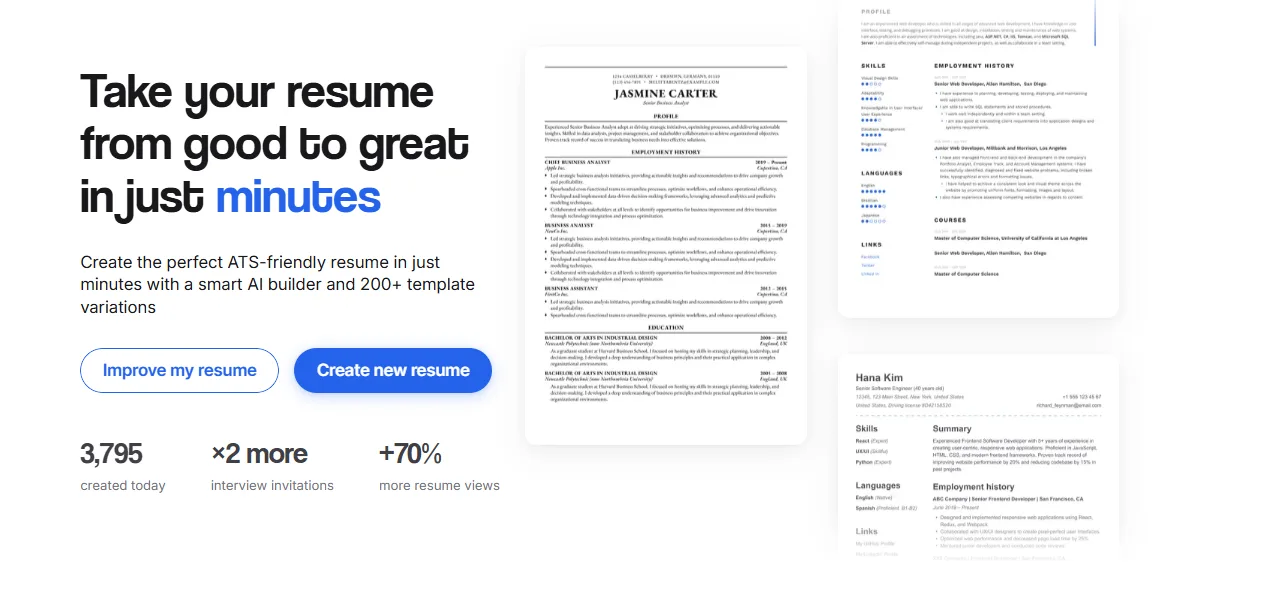Making a career change from HR involves careful preparation; you should understand the skills you already have and how to reframe them, as well as the pathways worth considering.
It is also wise to plan for additional training and manage your finances to make the transition less stressful. In this guide, you will find some tips on how to achieve all that and find a suitable, long-term career option. Read on!
Key Takeaways
If you are sick of handling conflict and administrative tasks, prefer creative work, and disagree with company policies, it might be time for a career change from HR.
Your transferable hard skills as an HR professional include the ability to handle complex data and understand workplace regulations, while your soft skills include effective communication and collaboration.
When writing a career change resume, highlight your measurable impact by focusing on results, not responsibilities.
You can consider related career options, such as talent acquisition or risk management, or complete career pivots such as healthcare administration.
Manage your salary expectations, create a transition fund, and invest time in upskilling or reskilling to set yourself up for the best career change from HR.
4 Key Signs It’s Time to Leave HR
Before exploring the career change options for HR professionals, you should take a moment to reflect on whether it is truly time to move on from this field. Here are some signs to look out for:
#1. You’re Burned Out from Constant Conflict
Working in HR means constantly dealing with conflict. From mediating employee disputes to fielding complaints about managers, the emotional strain can take a toll over time.
The emotional labor will eventually outweigh the satisfaction you once felt from helping people. So, if you dread clocking in every day because your inbox is full of issues to resolve, a career change might be the right move.
#2. You’ve Outgrown Internal Admin Work
HR often involves a lot of behind-the-scenes tasks, like tracking leave balances, updating policies, and preparing contracts. These are important, but they can start to feel repetitive over time. If you are starting to lose interest or notice that your skills are not being used to their full potential, it may be time to look for roles that offer more variety.
#3. You’re Drawn to More Creative Roles
Over time, HR can start to feel narrowly focused on compliance, with limited room for creative thinking. Because of this, you may begin to feel like you have hit a wall.
If you are always thinking about building new ideas and would choose to do so over managing policies and procedures, take it as a sign to explore alternatives to HR. Shifting into a more creative role can help you feel more challenged and fulfilled.
#4. Your Values Clash With Your Company’s Policies
Even when you personally disagree with company policies, you still have to enforce them as an HR professional. This internal conflict can build up over time and chip away at your motivation.
Regularly questioning leadership decisions, dreading disciplinary actions, or feeling uncomfortable supporting certain practices are all signs that your values may no longer align with your role. In this case, a career change from HR may be a wise choice.
6 Key Transferable Skills from HR

To make the best career change from HR, you need to identify your transferable skills. These are some abilities that you can apply in different jobs and industries, and that can help you switch roles with more confidence.
Below, we will cover the most valuable hard and soft skills you can transfer from HR to another field and teach you how to present them effectively on your resume.
3 Hard Skills That Transfer Well
You might not realize it, but working in human resources equips you with many technical skills, including:
HR Hard Skills
Handling complex data systems. Your ability to handle complex data systems, for example, when you manage employee records in an HRIS platform, demonstrates strong technical competence. This is a core requirement for positions like business analyst, operations coordinator, and database administrator.
Writing onboarding guides, SOPs, or training manuals. Your experience sets you up for success in roles such as instructional designer, technical writer, and documentation specialist. With such skills, you can also consider becoming a corporate trainer, program coordinator, or learning and development specialist.
Understanding of workplace regulations. Being able to accurately interpret and apply workplace policies allows you to excel in risk management. Positions like compliance coordinator or regulatory affairs associate rely on this expertise. Even roles in corporate ethics make strong use of your background in managing sensitive issues and staying up to date with legal standards.
3 Soft Transferable Skills Developed in HR
Your soft HR skills are just as valuable as your hard skills. These can set you apart in the most competitive industries because they are often harder to teach, and they include abilities such as:.
HR Soft Skills
Communication. In people-facing roles, your ability to communicate effectively and empathetically helps you create stronger relationships with clients, colleagues, or stakeholders.
Organization. Every day, you manage schedules, coordinate interviews, and maintain employee records. Juggling all these requires strong organizational skills. In other industries, like education, healthcare, and hospitality, being able to stay on top of things is an asset.
Supporting team dynamics. Your experience gives you an edge in many industries. In roles that directly involve employee experience and depend on cross-functional collaboration, being a team player can make all the difference. Plus, this is important even if your next position after HR is a remote one.
Quantifying Your Achievements
As an HR professional, you know that a strong career change resume highlights measurable impact. It allows employers in other industries to understand your value quickly and easily.
To quantify your achievements, focus on your results, not your responsibilities. For example, maybe within the last six months, you:
Onboarded 20+ employees and slashed ramp-up time by 30%
Resolved 70% of internal problems to improve productivity by 20%
Reduced employee turnover by 15% through wellness initiatives
Implemented HRIS to automate tasks and saved 5 hours per week
If you have numbers, use them, but ensure they help show how your work directly supports business goals.
11 Top Alternative Careers for HR Professionals

There are many career paths that you can pursue with an HR background. Some are more closely related, while others involve complete pivots, and you should choose the one that aligns with your strengths, values, and long-term goals.
Related Fields With Easier Transitions
These career change options for HR professionals make the most of your existing skill set:
Fields Related to HR
Talent acquisition. This is a natural next step because you already know how to source, interview, and onboard candidates. Unlike general HR, however, you do not have to handle internal disputes or compliance issues as regularly as building talent pipelines.
Learning and development. L&D roles let you work on employee growth without the disciplinary conversations, which is a better fit if constantly handling conflict was part of why you left HR. However, you can still make use of your experience in creating training materials and supporting career advancement.
Operations or office management. Operations associate, administrative manager, and project coordinator roles benefit from your people management skills. However, they typically involve less emotionally draining tasks and give you more control.
Risk management. This is a good option if you prefer working with systems. Your familiarity with regulations and experience enforcing them carry over well into identifying and minimizing risks within an organization. You can become an internal auditor, risk coordinator, or compliance analyst.
Complete Career Pivots
The best career change from HR for you might also be an entirely fresh field, like:
Fields Unrelated to HR
Healthcare administration. This can be a fulfilling option if you still have a strong sense of purpose when it comes to helping people. You already understand the importance of compliance and clear communication, so the switch will be smoother.
Copywriting or content writing. If you have solid writing skills from drafting policies, training materials, and announcements, this can be a suitable next position after HR. It is less emotionally demanding but allows you to work more creatively.
Technology product management. Your problem-solving skills and experience aligning people and processes make it easy to transition from HR to technology product management. You can become a technical program coordinator, product operations specialist, or associate product manager.
Entrepreneurial Opportunities
If you want to set out on your own, you can engage in:
Entrepreneurial Career Fields
HR consulting. You can help small to mid-sized businesses improve their hiring practices, onboarding systems, or compliance workflows. This option lets you stay close to the work you already know, but with more freedom over clients and projects.
Interview preparation services. You can provide resume reviews, practice mock interviews, and tailored resources like career change cover letter samples to help professionals with their job search journey.
Recruiting and staffing services. Leveraging your experience with talent management, you can start your own agency to connect companies with the right candidates. Compared to an in-house HR role, you can better control your workload.
Online workshop or course creation. Pack your unique insights into workshops or courses and offer them online. You can focus on topics such as team dynamics, workplace communication, and HR for startups.
Education and Upskilling Considerations

When making a career change from HR, whether you need to upskill or reskill depends on the path you choose to pursue.
Do You Need Additional Degrees or Certifications?
You need additional degrees or certifications when transitioning into a completely different field. For instance, you will need a graduate degree to become a licensed therapist or a CPA if you want to enter accounting.
However, many alternatives to human resources just require a short course to boost your credibility. For example, a coding bootcamp can give you an edge in technical fields like data analysis.
Self-Directed Learning Approaches
Google Career Certificates, LinkedIn Learning, and Coursera offer flexible learning options. With these, you can learn at your own pace without spending a fortune. But before enrolling in any programs, you need to spend some time researching job titles and descriptions. Look at what qualifications are consistently listed so you can narrow your focus.
You can also listen to podcasts, follow industry blogs, and join communities and forums online to stay updated and build your knowledge organically. These resources are typically free and can help you understand real-world applications, trends, and expectations. It is especially useful if you are still exploring career change options for HR professionals.
Financial Planning for Your Transition
While preparing for your career change from HR, you will likely see a dip in your budget, as you may need to invest in new courses, certificates, or degrees. Regardless of the reason, planning ahead can make this period less stressful.
Salary Expectations During and After Transition
Part of transitioning out of HR is managing your salary expectations. If you are switching to a new industry, you will probably start at a lower level or take a temporary pay cut. Over time, your earnings can grow as you gain new skills and prove your value. Nonetheless, HR-adjacent roles, like those in L&D, may offer lateral moves with similar compensation.
It is best to research average salaries on platforms like Payscale, Glassdoor, and the U.S. Bureau of Labor Statistics. Filter the data by your location; that way, you can understand what to aim for, avoid underpricing yourself, and prepare for any financial adjustments in the short run.
Creating a Transition Fund
A transition fund is money you set aside to support you during a career change. It gives you more flexibility and ensures you are not pressured to take the first available job. To build one:
Review your current expenses and identify areas you can cut back temporarily.
Set a target of three to six months of essential living costs.
Automate your savings by scheduling transfers of a fixed amount each month.
Tip: Create a separate account to reduce the temptation of spending impulsively. Also, track your progress to stay motivated.
Resume Builder and Templates for Career Changers

A successful career change from HR relies on a strong resume that highlights your strengths and reframes your experience. With Resume.co, you can choose from 200+ ATS-friendly templates made specifically for career changers and customize them in minutes.
Plus, by reading our blogs, you can learn how to avoid common resume mistakes and stay aligned with the latest resume trends to increase your chances of landing interviews.
This browser-based tool also offers expert-written content suggestions tailored to your new industry, so you do not have to start from scratch. You can access matching cover letter templates and samples to help you craft a compelling application as well.
Final Thoughts
Making a career change from HR might feel daunting, but with proper preparation, going through this smoothly is absolutely possible. By identifying your transferable skills, exploring alternatives, managing your expectations, and creating a transition fund, you can transition to another field seamlessly.
Remember that your resume plays an important role. Invest time into polishing it and pair it with a well-crafted cover letter using Resume.co to show why you are a fit for your new role.


